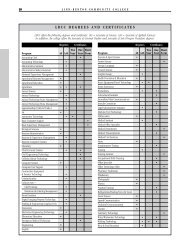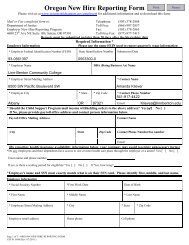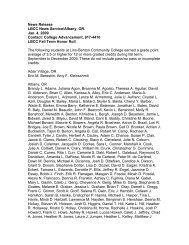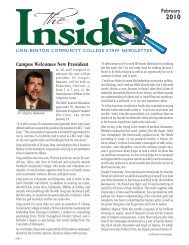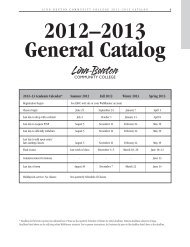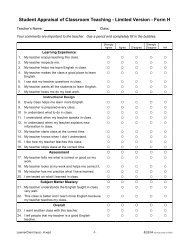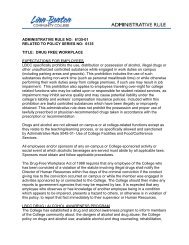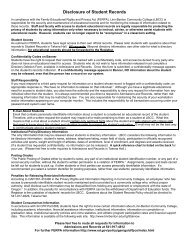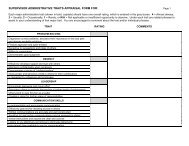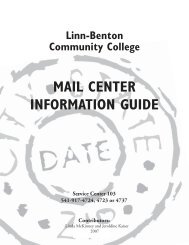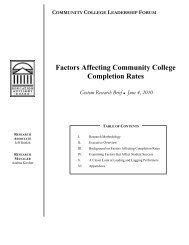2013-2014 LBCC Catalog (complete PDF file) - LBCC Paperless ...
2013-2014 LBCC Catalog (complete PDF file) - LBCC Paperless ...
2013-2014 LBCC Catalog (complete PDF file) - LBCC Paperless ...
You also want an ePaper? Increase the reach of your titles
YUMPU automatically turns print PDFs into web optimized ePapers that Google loves.
L I N N - B E N T O N C O M M U N I T Y C O L L E G E 2 0 1 3 - 2 0 1 4 C A T A L O G<br />
19<br />
Linfield Partnership<br />
Albany Community Education<br />
Cathy Edmonston, 541-917-4840<br />
Linfield College offers you the opportunity to earn a Bachelor’s<br />
degree by taking classes online, evenings and weekends at different<br />
locations within Oregon as well as being advised by a Linfield academic<br />
advisor at <strong>LBCC</strong>. Courses are offered that lead to a Bachelor of Arts or a<br />
Bachelor of Science degree in Accounting, Arts and Humanities, Business<br />
Information Systems, International Business, Management, and<br />
Social and Behavioral Sciences. Linfield also offers a Bachelor of Science<br />
in Nursing. Up to 108 <strong>LBCC</strong> credits may be transferred to Linfield College.<br />
You also may be able to receive up to 31 semester credits toward<br />
your degree through the Prior Learning Portfolio Program. For additional<br />
information, contact the Linfield academic advisor at 541-917-4846<br />
or visit the Web site: www.linfield.edu/dce.<br />
Other Learning Opportunities<br />
Distance Education<br />
Manager: Steve Smith; Willamette Hall 110, 541-917-4604<br />
<strong>LBCC</strong>’s distance education courses allow students to earn degrees<br />
or upgrade existing skills at their own convenience. Students who find<br />
it difficult to attend a course on campus have an alternative that gives<br />
them the flexibility of pursuing their educational goals by utilizing the<br />
Internet. This technologies deliver educational opportunities directly to<br />
the student, whether in the home, in the workplace or in a distant community.<br />
<strong>LBCC</strong> has taught distance education classes to more than 20,000<br />
students since 1979. Please refer to the Distance Education pages of the<br />
quarterly Schedule of Classes for a list of these courses.<br />
Registration Information<br />
Students register for distance learning classes the same way they do<br />
for regular <strong>LBCC</strong> courses. For <strong>complete</strong> class information: www.linnbenton.edu/go/distance-education.<br />
Distance learning students may become fully admitted to <strong>LBCC</strong>.<br />
Students may apply for admission, take placement tests, <strong>complete</strong><br />
orientation, use advising and register for classes online.<br />
Admission forms are available at www.linnbenton.edu/go/admissions.<br />
Click on “Forms” and select “Application for Admission.”<br />
Complete the application and mail it with the $30 application fee.<br />
Schedule your Computerized Placement Test: www.linnbenton.edu/<br />
student-assessment.<br />
Tests must be proctored. Appointments are required. The math, reading<br />
or writing placement test is required of all admitted students and<br />
non-admitted if you choose to take a math, reading or writing course as<br />
a part-time student. If you believe you already possess course skills, you<br />
may request to have the test(s) waived by completing a Petition to Waive<br />
form (available at the Admissions Web site) and by submitting documentation<br />
of previous college coursework.<br />
Cooperative Work Experience<br />
Takena Hall 101, 541-917-4787, www.linnbenton.edu/go/CWE<br />
Cooperative Work Experience (CWE) provides you with the opportunity<br />
to earn up to 14 credits for working or volunteering in a job<br />
related to your <strong>LBCC</strong> program of study. This allows you to explore an<br />
occupation, gain work experience, make professional contacts and apply<br />
classroom knowledge to real-world settings. You may be exposed to work<br />
methods not taught in the classroom and have access to equipment not<br />
typically available in the college laboratory. A primary focus of CWE is to<br />
reinforce classroom theory and provide learning experiences not available<br />
in the classroom.<br />
All students in CWE register also in WE 202 CWE Seminar, an opportunity<br />
to share work- related experiences and an opportunity for the CWE<br />
coordinator to monitor student progress.<br />
If you are interested in building Cooperative Work Experience into a<br />
program at <strong>LBCC</strong>, discuss it with your program advisor and the CWE coordinator<br />
to plan the most appropriate term for registration. You should<br />
plan your CWE the term before you begin working and allow ample time<br />
for locating a training site.<br />
Service Learning<br />
Takena Hall T-101, 541-917-4787, www.linnbenton.edu/go/CWE<br />
Service Learning is another way of earning credit for experience outside<br />
the classroom. Like Cooperative Work Experience, Service-Learning<br />
allows you to gain experience related to your major. The distinction<br />
is that Service-Learning allows you to apply your skills working with<br />
community partner non-profits in addressing real community needs.<br />
In addition to identifying learning outcomes, you engage in faculty-led,<br />
guided reflection activities designed to promote critical thinking, citizenship<br />
and civic responsibility. The reflection may take the form of discussion,<br />
oral presentations or a reflective journal.<br />
If you are interested in receiving credit for Service Learning, please<br />
contact the Service Learning Coordinator the quarter before you wish<br />
to register to allow time to discuss your interests and goals and to find<br />
a Service Learning site. Students may also participate in service projects<br />
sponsored by <strong>LBCC</strong> Student Life and Leadership. Some instructors also<br />
choose to incorporate Service Learning into their curriculum.<br />
Reserve Officer Training Corps<br />
ROTC Coordinator:<br />
Rich Horton, 541-917-4791; Takena Hall 101<br />
In cooperation with Oregon State University, <strong>LBCC</strong> provides an opportunity<br />
for men and women to participate in courses that are part of<br />
Reserve Officers Training Corps program while attending <strong>LBCC</strong>. All the<br />
courses are taught on the OSU campus. Students pay regular <strong>LBCC</strong> tuition<br />
rates to participate in the course work.<br />
Through a program of instruction coordinated with the normal<br />
academic curriculum, ROTC selects and prepares individuals to serve as<br />
officers in the regular and reserve components of the Army and Air Force.<br />
ROTC strives to develop students morally, mentally and physically;<br />
cultivate in them a capacity for leadership; and to provide them with<br />
the basic working knowledge required of a young officer.<br />
Aerospace Studies (Air Force ROTC)<br />
Air Force ROTC allows you to compete for a commission as an officer<br />
in the United States Air Force. Opportunities exist for well-qualified<br />
students from all fields. Scholarship opportunities are especially bright<br />
for students with majors related to science, engineering and mathematics.<br />
The Air Force is particularly interested in students who are leaning<br />
toward careers as pilots or navigators. Two- and four-year programs are<br />
available.<br />
Army ROTC<br />
This program offers eligible men and women the opportunity to<br />
compete for commissions as officers in the United States Army. Basic and<br />
advanced programs with multiple entry points can be tailored to your<br />
needs. If you are interested in an aviation career, you will have the<br />
opportunity to become an officer pilot in fixed or rotary wing aircraft.<br />
Merit scholarship opportunities exist for students in any approved<br />
academic discipline, particularly in engineering, science, business and<br />
social science.




